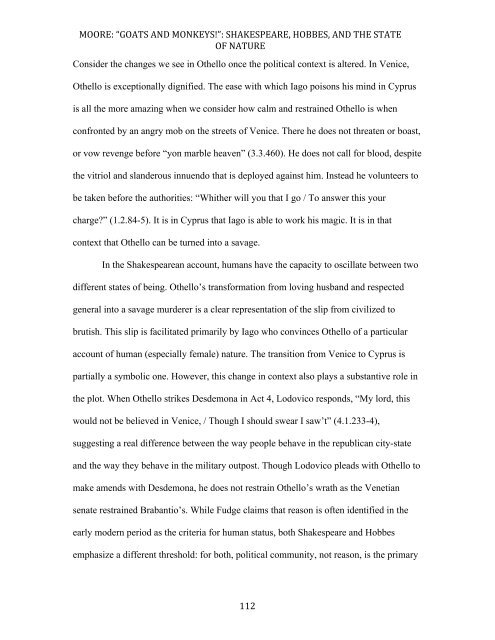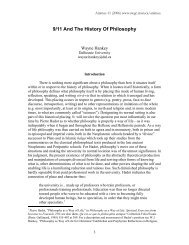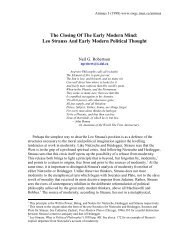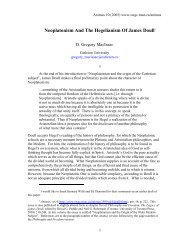âgoats and monkeys!â: shakespeare, hobbes, and the state of nature
âgoats and monkeys!â: shakespeare, hobbes, and the state of nature
âgoats and monkeys!â: shakespeare, hobbes, and the state of nature
You also want an ePaper? Increase the reach of your titles
YUMPU automatically turns print PDFs into web optimized ePapers that Google loves.
MOORE: “GOATS AND MONKEYS!”: SHAKESPEARE, HOBBES, AND THE STATE <br />
OF NATURE <br />
Consider <strong>the</strong> changes we see in O<strong>the</strong>llo once <strong>the</strong> political context is altered. In Venice,<br />
O<strong>the</strong>llo is exceptionally dignified. The ease with which Iago poisons his mind in Cyprus<br />
is all <strong>the</strong> more amazing when we consider how calm <strong>and</strong> restrained O<strong>the</strong>llo is when<br />
confronted by an angry mob on <strong>the</strong> streets <strong>of</strong> Venice. There he does not threaten or boast,<br />
or vow revenge before “yon marble heaven” (3.3.460). He does not call for blood, despite<br />
<strong>the</strong> vitriol <strong>and</strong> sl<strong>and</strong>erous innuendo that is deployed against him. Instead he volunteers to<br />
be taken before <strong>the</strong> authorities: “Whi<strong>the</strong>r will you that I go / To answer this your<br />
charge” (1.2.84-5). It is in Cyprus that Iago is able to work his magic. It is in that<br />
context that O<strong>the</strong>llo can be turned into a savage.<br />
In <strong>the</strong> Shakespearean account, humans have <strong>the</strong> capacity to oscillate between two<br />
different <strong>state</strong>s <strong>of</strong> being. O<strong>the</strong>llo’s transformation from loving husb<strong>and</strong> <strong>and</strong> respected<br />
general into a savage murderer is a clear representation <strong>of</strong> <strong>the</strong> slip from civilized to<br />
brutish. This slip is facilitated primarily by Iago who convinces O<strong>the</strong>llo <strong>of</strong> a particular<br />
account <strong>of</strong> human (especially female) <strong>nature</strong>. The transition from Venice to Cyprus is<br />
partially a symbolic one. However, this change in context also plays a substantive role in<br />
<strong>the</strong> plot. When O<strong>the</strong>llo strikes Desdemona in Act 4, Lodovico responds, “My lord, this<br />
would not be believed in Venice, / Though I should swear I saw’t” (4.1.233-4),<br />
suggesting a real difference between <strong>the</strong> way people behave in <strong>the</strong> republican city-<strong>state</strong><br />
<strong>and</strong> <strong>the</strong> way <strong>the</strong>y behave in <strong>the</strong> military outpost. Though Lodovico pleads with O<strong>the</strong>llo to<br />
make amends with Desdemona, he does not restrain O<strong>the</strong>llo’s wrath as <strong>the</strong> Venetian<br />
senate restrained Brabantio’s. While Fudge claims that reason is <strong>of</strong>ten identified in <strong>the</strong><br />
early modern period as <strong>the</strong> criteria for human status, both Shakespeare <strong>and</strong> Hobbes<br />
emphasize a different threshold: for both, political community, not reason, is <strong>the</strong> primary<br />
112
















